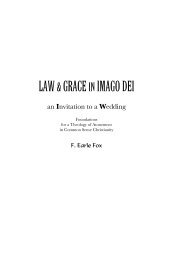Download entire 232-page book HERE (PDF ... - MassResistance
Download entire 232-page book HERE (PDF ... - MassResistance
Download entire 232-page book HERE (PDF ... - MassResistance
Create successful ePaper yourself
Turn your PDF publications into a flip-book with our unique Google optimized e-Paper software.
irths, of single-parent households, and of never-married couples living with their respective children,<br />
have all remained high or increased over the last 3 or 4 decades.<br />
If, then, the natural family does lose its important value to Americans (as many have urged<br />
that it should), what changes can we expect for our society’s future?<br />
Task sharing<br />
Task sharing is called “division of labor” in a large group. Complex economies are built on<br />
this function, which can easily be seen in any small or large business, government bureau, educational<br />
institution, etc. It is a function which any child can observe in a mother and father, who, simply by<br />
their physical differences, tend to break the work into parts best suited to their bodies and life cycles.<br />
The ability to break down work and parcel it out is passed on to children in the form of assigned<br />
chores, and acted out by them in playing house. Without early and constant exposure to task sharing,<br />
children do not function well in a society that has a complex division of labor. In practically every<br />
walk of life, people must have the skill of dividing work among themselves fairly and efficiently, or<br />
large tasks cannot get done. In a society where task sharing skills are on the decline, we would expect<br />
to find a low level of cooperation and initiative among employees, fewer and less effective community<br />
organizations and more of a “survivalist” mentality, in which people separate themselves from<br />
the group rather than pooling their skills.<br />
Mutual reliance<br />
The best school of mutual reliance is the ability to watch people of opposite genders and<br />
different physical abilities count on each other and combine their efforts to get routine work done or<br />
meet special needs, or simply to “be there” for each other. From this early school, a child learns to<br />
be prepared to expect reliable help from others and to be available to give help on both a regular and<br />
a temporary basis. Without the practice of mutual reliance, schedules cannot be kept, personal or<br />
group crises are not easily dealt with, and as with task sharing, large complex tasks and organization<br />
are out of the question. People go without the sense of personal security that comes from being able<br />
to place their confidence in others. In such a society, we would expect a low level of trust and a high<br />
level of personal stress arising from not being able to count on others for necessary help.<br />
Unselfishness<br />
The natural family provides the very best opportunity to learn to put aside your own desires<br />
in favor of someone else’s needs, or in deference to a valued relationship. When a man turns off the<br />
game on TV to listen to his wife’s story of the day’s events, he models unselfishness to his children,<br />
just as he also requires it of them when he asks them to share their toys with friends or siblings. In<br />
this way, children learn that they should not expect to always be “Number One,” and that many things<br />
in life are better and more enjoyable when you put someone else first. In a society where many<br />
people grow up without this important understanding, we would find widespread rudeness, much<br />
theft, unnecessary competition and conflict, poor relationship skills, and high levels of domestic<br />
Redeeming the Rainbow 91






